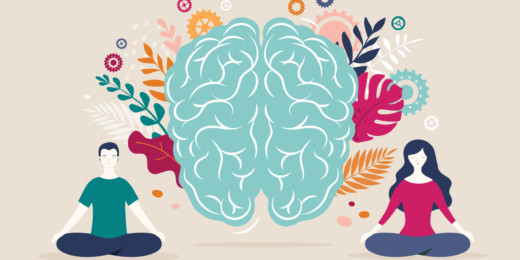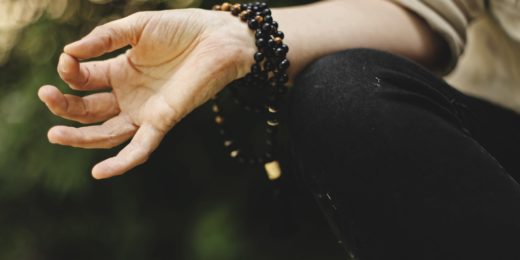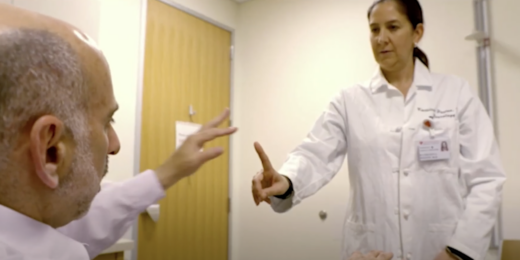The United States recently reached 1 million deaths from COVID-19, which was incomprehensible when the pandemic began. People have lost parents, children, friends and other loved ones, and the pandemic has morphed into a dark perpetual cloud under which we all must live.
And living with it, said Stanford Medicine psychiatrist David Spiegel, MD, means living with prolonged grief that is felt not only by the people whose loved ones have died, but also by the collective community.
To gain perspective, I asked Spiegel to talk about community grief, the impact it has on the health of individuals and communities, what we can do to care for ourselves and others, and how we return to normal activities even as we accept that COVID-19 will still be with us for a while. The following Q&A is edited and condensed from my conversation with Spiegel, who is the director of the Stanford Medicine Center on Stress and Health.
How does COVID-19 spur community grief?
Unfortunately, the pandemic is a disaster that everybody is experiencing every day, in some form or another, unlike other commonly occurring causes of grief and death like gun violence, cancer and other diseases. Those deaths don't have the commonality COVID-19 does.
Another factor is the sheer scale of the deaths caused by the virus: For every person who dies, there are probably five to 20 people who were close to them and are suffering terrible and unexpected loss.
It's one thing if you get terminal cancer; it's a terrible thing, but you know you've got time to decide how you want to spend the time have left, to settle your affairs and to prepare loved ones for your death.
COVID-19 deaths can happen suddenly, and many people have died without being able to see, hold, talk to or say goodbye to the people closest to them. For their loved ones, that lack of closure complicates grief, adding extra fear and uncertainty to the already collective fear about COVID-19.
What's the impact of prolonged grief on individuals and communities?
It becomes demoralizing after a while, feeling sort of inescapable. During grieving, there is typically a period of intense yearning, loss and sadness, then you reenter the world and eventually move beyond the intense period.
Now, it feels like this endless drumbeat of the threat of illness and of loss, one after another.
We've had to endure a lot of disruptions, including in our ability to do what our grandmothers told us to do to stay healthy -- eat well, sleep well, get plenty of exercise. During the lockdown, many of us were underexposed to sunlight, which helps regulate your circadian rhythms by signalling our bodies when to be active (during the day) and when to sleep (at night).
The pandemic has also disrupted some of the fundamental health maintenance and stress response mechanisms: The dysregulation of circadian rhythms and stress hormones like cortisol -- which is important for regulating glucose metabolism -- has real adverse health effects. This can worsen risk for diabetes, obesity and heart disease
Our research has found that women with advanced breast cancer who did not have normal circadian rhythms of cortisol, which should be high in the morning and low in the evening, died sooner of breast cancer.
Who do you think is most impacted by prolonged grief?
Some of the people who have suffered the most in our studies and in others are, oddly enough, young people -- the people who, from a mortality point of view, are least at risk. But they suffer more because, in your late teens and 20s, there's a crucial life transition during which you outgrow your family of origin and build your own family. And that is very hard to do now; people are simply more secluded and there's a new danger to navigate, too.
It has also interfered with the social engagement that is important for young people, adding more pain and disruption for them. Childhood and early adulthood ought to be fun, and being constantly surrounded with danger and loss puts a damper on the expansiveness of this stage.
How can we, as a collective community, pull together to support one another?
There is a real psychological benefit from masks and vaccines -- they help you not only protect yourself but also make you feel like you're doing something to reduce risk from this terrible pandemic.
The uncontrollable loss of COVID-19 makes you feel helpless. But taking actions to prevent yourself from getting sick is in your control. And it protects you and your family as well as your community. You're engaged in a common task of making the world as safe as possible, and building your commitment to your community.
These safety measures also make careful resumption of social activity possible and enjoyable. We are social creatures, so let's make the most of our opportunities for reconnection.
Photo by BillionPhotos.com






